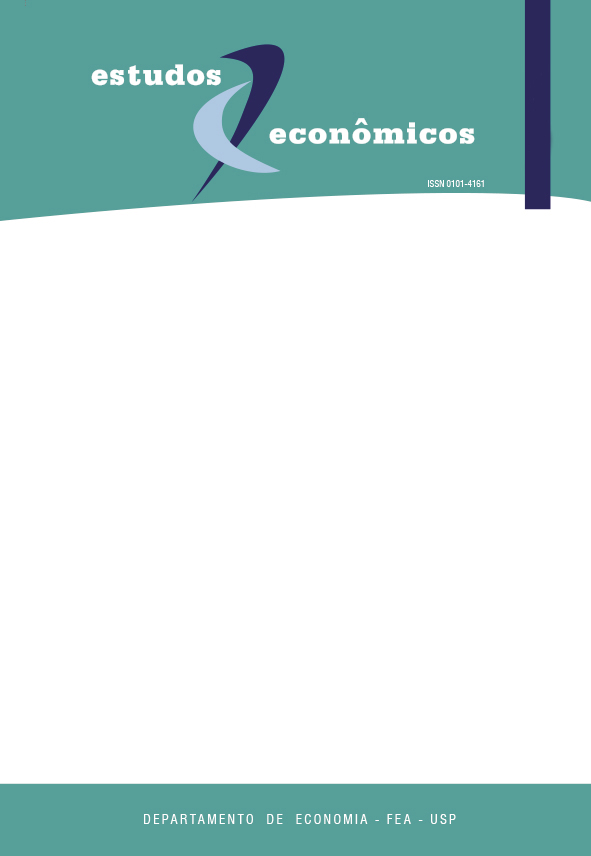Além do cânon: mão invisível, ordem natural e instituições
DOI:
https://doi.org/10.1590/S0101-41612007000300007Keywords:
Adam Smith, invisible hand, unintended consequences, natural order, institutionsAbstract
The article proposes a non-canonical understanding of Adam Smith´s invisible hand, which implied a careful reading of the original texts and their framing in the historical and intelectual context of their time. To reach this goal, we identify the connection between the invisible hand and correlated notions (natural order, non-intentional consequences) and we discuss deism and the role of institutions in Smith´s thought. The discussion is preceded by a brief exposition of the behavioral foundations of the Smithian theory, in which we looked for a better support to our conclusions.Downloads
References
Arida, Pérsio [1984]. A história do pensamento econômico como teoria e retórica.
In: Rego, J. M. (org.), Retórica na economia. Editora 34, 1996.
Arrow, Kenneth; Hahn, Frank. General competitive analysis. Holden Day, Inc., 1971.
Belluzzo, Luiz G. [1980]. Valor e capitalismo. Um ensaio sobre a economia capitalista.
IE/Unicamp, 1998.
Bianchi, Ana Maria. A pré-história da economia: de Maquiavel a Adam Smith. São Paulo: Hucitec, 1988.
Bianchi, Ana Maria; Nunes, Rubens. Ainda sobre os conceitos de paradigma e cânon
como instrumentos de reconstrução da história do pensamento econômico. Econômica, v. 4, n. 2, 2002.
Brown, Vivienne. Adam Smith´s discourse – Canonicity, commerce and conscience. Routledge, 1994.
Cardoso, José Luís. Natural law, natural history and the foundations of political economy. In: Davis, Marciano, Runde (eds.), The Elgar companion to economics and philosophy. 2002.
Cerqueira, Hugo. Para ler Adam Smith: novas abordagens. Texto para Discussão n.
, Cedeplar/UFMG, 2003.
Coase, Ronald. The wealth of nations. Economic Inquiry, v. 15, julho de 1977.
Elster, Jon. Making sense of Marx. Cambridge University Press, 1984.
Fonseca, E. Giannetti da. Vícios privados, benefícios públicos? A ética na riqueza das
nações. São Paulo: Cia das Letras, 1993.
Ganem, Angela. Adam Smith e a explicação do mercado como ordem social: uma abordagem histórico-filosófica. Revista Economia Contemporânea, v. 4, n. 2, p. 9-36, jul/dez. 2000.
Hayek, Friedrich. The results of human action but not of human design. In: Studies
in philosophy, politics and economics. The University of Chicago Press, 1967.
Henderson, W. The use of metaphor in economics. In: Backhouse (ed.), New directions
in economic methodology. Routledge, 1994.
Hirschman, A. As paixões e os interesses: argumentos políticos a favor do capitalismo
antes do seu triunfo. Ed. Record, 1977.
Hirschman, A. A retórica da intransigência. São Paulo: Cia. das Letras, 1992.
Hollander, S. Adam Smith and the self-interest axiom. Journal of Law and Economics,
v. 20, n. 1, 1977.
Macfie, Alec. The invisible hand of Jupiter. Journal of the History of Ideas, v. 32, n. 4,
p. 595-599, 1971.
Merton, Robert. The unanticipated consequences of purposive social action. American
Sociological Review, v. 1, n. 6, 1936.
North, Douglass. Institutions, institutional change and economic performance. CUP, 1990.
Nozick, Robert. Invisible-hand explanations. American Economic Review, 84, p. 314-318, 1994.
Nunes, Rubens. A articulação do paradigma clássico – Valor e mercado no pensamento
econômico (1803-1836). 1995. Dissertação (Mestrado), IPE/USP. São Paulo.
Raphael, D. D.; Macfie, A. L. Introduction. In: Smith, Adam, The theory of moral
sentiments. Oxford University Press, 1976.
Robbins, Lionel. [1952]. Teoria da política econômica. São Paulo: Ibrasa e Edusp, 1972.
Rosenberg, Nathan. Some institutional aspects of the wealth of nations. Journal of Political Economy, v. 18, n. 6, p. 557-570, 1960.
Rosenberg, Nathan. Adam Smith and laissez-faire revisited. In: O’Driscoll (ed.), Adam Smith
and modern political economy. Iowa University Press, 1979.
Rothschild, Emma. Adam Smith and the invisible hand. American Economic Review 84, 1994.
Santos, Antonio T. Loureiro. Adam Smith: comportamento econômico e resultados
sociais. Trabalho de conclusão do curso de graduação em Economia, FEA/USP, 2002.
Sen, Amartya. [1987]. Sobre ética e economia. São Paulo: Cia. das Letras, 1999.
Sen, Amartya. [1979]. Rational fools: a critique of the behavioural foundations of economic
theory. In: Sen, A., Choice, welfare and measurement, 1982.
Skinner, Andrew. Adam Smith: ethics and self-love. In: Jones, P.; Skinner, A. (orgs.),
Adam Smith reviewed. Edinburgh University Press, 1992.
Smith, Adam. [1759]. The theory of moral sentiments. The Glasgow Edition of the
Works and Correspondence of Adam Smith, Oxford University Press, 1976.
Smith, Adam. [1776]. An inquiry into the nature and the causes of the wealth of nations. The
Glasgow Edition of the Works and Correspondence of Adam Smith, Oxford University Press, 1976.
Smith, Adam. [1795]. The principles which lead and direct philosophical enquiries; illustrated
by the history of astronomy. In: Essays on philosophical subjects. The Glasgow Edition of the Works and Correspondence of Adam Smith, Oxford University Press, 1976.
Downloads
Published
Issue
Section
License
Copyright (c) 2007 Antonio Tiago Loureiro Araújo dos Santos, Ana Maria Bianchi

This work is licensed under a Creative Commons Attribution-NonCommercial 4.0 International License.
By submitting an article, the author authorizes its publication and attests that it has not been submitted to any other journal. The original article is considered final. Articles selected for publication are proofread for grammatical and orthographic errors. The journal does not pay rights for published articles. The Institute of Economic Research from the School of Economics, Business and Accounting of the University of São Paulo (Instituto de Pesquisas Econômicas da Faculdade de Economia, Administração e Contabilidade da Universidade de São Paulo) owns the journal's copyright.




